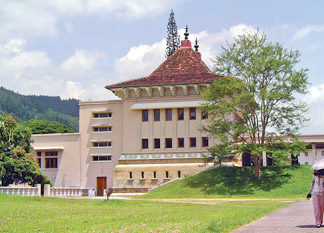Peradeniya number one in the country
According to the latest world university rankings announced by
Webometrics (http://www.webometrics.info/rank_by_country.asp?country=lk),
the University of Peradeniya has topped Sri Lanka while the University
of Colombo and University of Moratuwa have secured the second and third
places respectively.
|

University of Peradeniya |
But it is so unfortunate that the number one in Sri Lanka holds
2220th position in the world which should lead to a debate among the
university professionals. In its heydays, Peradeniya was the pick of
South Asia, even though now it holds the 20th position.
It is true that Sri Lankan universities do not have the luxury of
high tech facilities but we should admit that the exposure to graduate
studies and researches done in the universities are not adequate, both
quality and quantity wise, to climb up the world rankings. One can argue
that these rankings do not reveal the real image of a university but the
people who have conducted the study, Webometrics, have looked upon
several aspects that make the rankings justifiable.
They have clearly mentioned that they formally and explicitly adhere
to the ‘Berlin Principles of Higher Education Institutions’. Its
ultimate goal is the continuous improvement and refinement of the
methodologies according to a set of agreed principles of good practices.
It is important to look at three of the major criteria that the
Berlin Principles adhere to when it comes to depicting the purposes and
goals of ranking of a particular university:
Be one of a number of diverse approaches to the assessment of higher
education inputs, processes and outputs.
Rankings can provide comparative information and improved
understanding of higher education, but should not be the main method for
assessing what higher education is and does. Rankings provides a
market-based perspective that can complement the work of government,
accrediting authorities and independent review agencies.
Recognize the diversity of institutions and take the different
missions and goals of institutions into account.
Quality measures for research-oriented institutions, for example, are
quite different from those that are appropriate for institutions that
provide broad access to underserved communities. Institutions that are
being ranked and the experts that inform the ranking process should be
consulted often.
Specify the linguistic, cultural, economic and historical contexts of
the education systems being ranked.
International rankings in particular should be aware of possible
biases and be precise about their objective. Not all nations or systems
share the same values and beliefs about what constitutes ‘quality’ in
tertiary institutions and ranking systems should not be devised to force
such comparisons.
Thus these rankings give us a hint so that the Sri Lankan
universities should improve our researches and the quality in the
graduate studies to climb up the rankings which is not impossible.
Professors, senior lecturers, undergraduates, graduates and finally the
government can get-together to discuss ways of improvement. |



